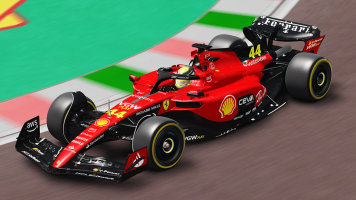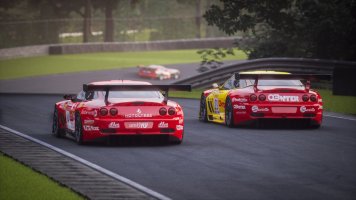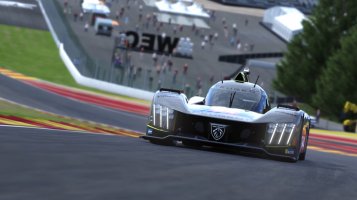You are using an out of date browser. It may not display this or other websites correctly.
You should upgrade or use an alternative browser.
You should upgrade or use an alternative browser.
Formula Legacy Manager - 2010s
- Thread starter Meff28s
- Start date
- Status
- Not open for further replies.
+3 Aero (900)
+1 Engine (300)
+1 Mech (200)
+1 Engine (300)
+1 Mech (200)
Αll on mech
Market is closed !

2020 Formula Legacy Season (13-16)






The 2020 season is over ! Congratulations to the winner !
FLM 1.0 is ending. Thank you all for having played this game, for your loyalty and your interest during all those months. The game started on November 2016 and we're now a year later. We played 50 years of Formula One with tough battles, rivalries, failure and success. Hope you enjoyed it as much as I did

2020 Formula Legacy Season (13-16)






The 2020 season is over ! Congratulations to the winner !
FLM 1.0 is ending. Thank you all for having played this game, for your loyalty and your interest during all those months. The game started on November 2016 and we're now a year later. We played 50 years of Formula One with tough battles, rivalries, failure and success. Hope you enjoyed it as much as I did
10/10 for the game, despite some quite catastrophic misplays by me...
Looking forward to 2.0!
Looking forward to 2.0!


Ben Utzer was first employed as a car engineer for Honda in 1967. It was there he met 1964 World Champion John Surtees, who was racing for the Japanese works team. When Surtees decided to create his own F1 team in 1970 (Surtees Racing Organisation), Utzer was free. Surtees signed him in June as his private engineer and Utzer began work on the 1971 car, the Surtees TS9.
Due to his skills and knowledge, Utzer’s influence in the team grew rapidly, earning him the title of Head Manager in January 1971.
Surtees Racing Organisation 1971-77
However, the TS9 chassis did not meet with expectations, scoring only 8 points in two seasons (1971-72). When John Surtees retired from racing, he delivered Utzer an ultimatum: Win with this new car, or your career is over.
Fortunately for Utzer, Patrick Depailler, behind the wheel of the newly-designed TS14, won the first race of his career at his home French GP in 1973.
1974 was also a success, and the TS16 finished 3rd in the Constructors’ Standings. Depailler ended up only 1 point behind the Super Swede Ronnie Peterson in his BRM.
Because of his incredible season, Depailler left Surtees when he signed with Ferrari in 1975. Utzer chose personally another French driver to replace him, the former Jackie Stewart teammate François Cevert. His TS16 was an improvement over the TS14 , and allowed Cevert to take the Driver’s Championship, but the team failed to take the Constructors’, which was won again by BRM.
1976 and 1977 weren’t as good as expected, and the team were forced to close their doors at the end of the 1977 season.

ATS (Auto Technisches Spezialzubehör) 1978-89
Utzer was offered a partnership with Günter Schmid, and ATS was born. The German team started with two awful seasons in 1978 and 1979, with only 6 points gained. Utzer knew that he needed a famous driver to attract sponsors and to engineer a better car. 1973 World Champion Emerson Fittipaldi was sort of a castaway at that time, driving for March, a complete back-marker. Everyone in the paddock believed Fittipaldi was finished, and that he surely couldn’t win again. Utzer held a different opinion and signed him for the 1980 season. High risk, high reward, though, as Fittipaldi secured the very first ATS win in during the Canadian GP at the end of the season.
In 1981, he finished runner-up, only 1 point below his young countryman Nelson Piquet driving for Tyrrell and helped the team to finish 2nd.
1982 was even better, and Fittipaldi won his second and last Driver’s title, but the team failed again to take the a constructors’ championship.
At the age of 38, Fittipaldi decided to retire from racing and Utzer had to make a tough choice to replace him correctly. The German manager chose the young and promising Frenchman Alain Prost, who was driving for Lotus and ranked only 10th in 1982. Now that Prost had a proper car in which to show his skill, he immediately proved his worth by winning the Drivers’ Championship in 1983.
He managed just 3rd in 1984 despite winning 5 races. During those 2 years, ATS still was not able to secure a Constructor’s Championship. The Arrows squad of Lauda and Piquet were just too strong. In 1985, a shakeup of drivers up and down the paddock left ATS with the best car-and-driver combination. Despite his teammate only taken 4 points on the entire season, Prost was able to secure both the Driver’s and Constructor’s Championship single-handed. This was the first Constructors’ Championship for both ATS and boss Ben Utzer.
The following two seasons were also quite successful for ATS, seeing Prost at the top again in 1986. Even on points with Nelson Piquet, Prost actually finished second on total wins. Again it was a Piquet / Prost 1-2 in 1987. Despite finishing well for most of the 1980’s, poor financial management saw to the decline of ATS. The team managed 6th place in the Constructor’s in 1988, but failed to score any points in 1989.

Following the 1989 season, ATS shut down its factory.

Williams Grand Prix Engineering Ltd. 1990-20
Seeing his ultimate potential, Sir Frank Williams named Utzer as the new Williams head manager. Williams only won the constructors title once in 1982 (against Utzer’s ATS cars), and Williams gave the full executive powers to Utzer in order to win more titles. When he arrived in 1990, the team was a back-marker. One of his first key decisions was to hire driver Damon Hill, son of the former two-time Formula One Champion Graham Hill, an old but inexperienced F3 driver. After a slow rookie season, Hill managed to be a regular point-scorer for the team. He helped Williams move from the bottom to the top and the team finished twice with 3rd position of the season Standings. Williams was not letting that fool them, however, as they knew 3rd place was still 100 points off the leaders.
Failing to win a title for himself, Hill decided to sign with Sauber, and Utzer replaced him with the younger Schumacher brother : Ralf. With Ralf Schumacher and his Brazilian Teammate Rubens Barrichello, who was already in the team, Williams kept growing. Twice Williams found themselves finished 3rd in the season standings in 1998 and in 1999. To make matters worse, Utzer had to watch former driver Damon Hill take two titles with his new team.
What Utzer needed was a big name, someone capable of winning a title, to bring in new sponsorship money. He decided to renew Barrichello and release Ralf. This opened up the team to sign 7-time race winner Mika Häkkinen of Finland. Häkkinen, Barrichello and Utzer won both titles, in 2000 and in 2001.
Then, Williams became a solid Tier 2 teams with drivers such as Mark Webber and David Coulthard. After a very good 2006 season, Utzer signed the newly-crowned champion Fernando Alonso for three years. He was confident Alonso would get him at least a title, but the Spaniard failed to produce.
2007, 2008 and 2009 were very good years, but Williams ended up twice runner-up and once 3rd. The team slipped slowly to the bottom again until Utzer decided to hire another Finnish driver and former Renault world champion Kimi Räikkönen.
Like Fittipaldi before him, Räikkönen was declining and became quite anonymous on the grid, racing in a decent Honda. His best years was supposed to be behind him and picking him was, again, a dangerous bet. However, Utzer was quite never wrong with his drivers’ choices, and Räikkönen helped him winning a constructors’ championship, 15 years after the last one in 2001.
Räikkönen retired after the 2016 season, and Utzer hired Sebastian Vettel, already a 3-time World Champion who was struggling with a non-evolved Toyota. Without any surprise, in an unbeatable FW40, the German champion immediately secured his 4th personal title and brought both crowns to Williams.
However, 2018 and 2019 were more difficult years due to a regulation change. At the dawn of 2020, Utzer announced that he would retire from motor racing. This final season sounded as a jubilee and the Williams made a decent start, but they were far behind the Mercedes in every aspect. However, race after race, the gap reduced and they won on the edge at the very last race in Abu Dhabi.


Racing Records
During his Formula One career, Ben Utzer has become the most successful man in history, winning more titles and races than anyone. He’s still holding many records that surely won’t be easily beaten.
8 Drivers' Championships (1975, 1982, 1983, 1985, 2000, 2001, 2017 & 2020)
6 Constructors' Championships (1985, 2000, 2001, 2016, 2017 & 2020)
Daniel Harvey (Jordan - Mercedes) @Millsy24
"He is a great competitor, whilst also being gracious in victory and defeat"
Oorjit Mishra (Renault - Minardi - Force India) @oorjit07
"Ben Utzer is a great manager. It's funny to think at in my stint with Minardi, I could've won so many titles had the Williams team not been so bulletproof."
Milos Ancevski (Shadow - Arrows) @Milos
"At times, he is just unstoppable. With a competitive package, I've seen him dominate season after season with no signs of slowing down. I think a big part of his success is his professional approach, he was one of the most well organised people I've worked with."
Tobi Kederer (BRM) @kedy89
"I still hold a grudge for beating us for the drivers' title in 1975."
Jimmy Laad (Tyrrell - Honda - Renault) @Jimlaad43
"His cars were quicker than mine at certain points in history, and slower than mine during the other times"
Jordan Bradford (Ferrari) @Slyfrequency
"During my time as manager Ben Utzer showed great sportsmanship and was able to dominate the formula one scene during his time at Williams, I for one am very impressed!"
@Meff28s
Thank you very much for managing this forum game, a more than worthy addition to this forum section!
That's a cool article and summary of my actions in the game, thank you!
Also thank you for everyone else who participated. I am sure we all had our fun
Looking forward to rewrite history once again with Ferrari!
Thank you very much for managing this forum game, a more than worthy addition to this forum section!
That's a cool article and summary of my actions in the game, thank you!
Also thank you for everyone else who participated. I am sure we all had our fun
Looking forward to rewrite history once again with Ferrari!
!!! FLM 2.0 : Announcement !!!
I will launch the new thread for FLM 2.0 very soon. The question you may ask is : why a 2.0 ? why don't we continue with the same system ?
First of all, FLM 2 will be the same game. In my opinion, it's only an alternative version based on the same game concept. You have a team, you sign your drivers, you make your car better every market during a season. I've designed a new "gameplay" because I've noticed inherent problems that I haven't found a way to solve since November '16.
• Rewards system & Money management
We argued a lot about this to know what should be the best rewards system. Different sponsor or same sponsor, how to balance between every Tiers etc... The problem is, in my opinion, the rewards concept itself !
When your team performs well, you get more money.. so you make your car faster.. so you perform better than before.. so you get more money etc... it's a loop where the loosing team just keep loosing and loosing until a reshuffle. I think a money rewards system is intrinsically unfair and leads to a widening of the gap between teams. The solution I've worked on can't be more simple : get rid of money/rewards.
The "upgrades" system (based on spending money) is replaced by a "setup" system, a very simple mini-game (inspired by BATracer) where everybody will have to find the perfect "setting" to get the maximum pace from your car. Is isn't relied on race results so that the worst team can still setup its car better than anyone if he's smart enough.
• Tier System & Evolution of a team
I've tried everything to set the Tiers.. 4, 3, 6.. everything without finding something cool. What I've noticed is that no team has the evolution I was dreaming of : being a complete back marker, then a slightly better team, then fight for points, then podiums, then for titles. In FLM 1.0, it was basically : be a bad team (but not a back marker), have some luck with the reshuffle, spend everything on the car, become the best at the end of the season. Here's the idea I had to have a fluid, slow and smooth evolution :
4 Tiers. Each Tier gives you a minimum Pace. 3 teams per Tier (except Tier 4 which will have only 2 teams). Your aim will be to win your Tier Battle. The best team of a Tier in terms of results will be promoted next year in the Tier above. The worst team relegated in the Tier below. The team in the middle will just stay in its Tier.
This way we should see a constant turnover and no one will be stuck for decades in Tier 4. Signing the best rookies will let you have your momentum and access, season after season, the top of the Standings.
• Driver Signings & Off season
I'll keep the signings system exactly as he is except for contract length. I've found that signing order was a good idea, even better with the Rookies rules which will allow Tier 4 teams to rise with a young talent. Contract length will change a little as you'll now always be able to sign a driver for 2 or 4 years (no less, no more). 4 years because it is the minimum necessary time a team has to climb all the Tiers. This way, the guy that will sign Michael Schumacher as a Rookie in 1991 will be able to fight for the title in 1994 if he always wins his Tier battle every season.
I hope you understand those choices and I'm pretty sure you'll enjoy the new gameplay. I've tested the system during a week, from 1950 to 1967 (tough work ^^), where every team has always made the best decisions and they have all won at least one title.
I will launch the new thread for FLM 2.0 very soon. The question you may ask is : why a 2.0 ? why don't we continue with the same system ?
First of all, FLM 2 will be the same game. In my opinion, it's only an alternative version based on the same game concept. You have a team, you sign your drivers, you make your car better every market during a season. I've designed a new "gameplay" because I've noticed inherent problems that I haven't found a way to solve since November '16.
• Rewards system & Money management
We argued a lot about this to know what should be the best rewards system. Different sponsor or same sponsor, how to balance between every Tiers etc... The problem is, in my opinion, the rewards concept itself !
When your team performs well, you get more money.. so you make your car faster.. so you perform better than before.. so you get more money etc... it's a loop where the loosing team just keep loosing and loosing until a reshuffle. I think a money rewards system is intrinsically unfair and leads to a widening of the gap between teams. The solution I've worked on can't be more simple : get rid of money/rewards.
The "upgrades" system (based on spending money) is replaced by a "setup" system, a very simple mini-game (inspired by BATracer) where everybody will have to find the perfect "setting" to get the maximum pace from your car. Is isn't relied on race results so that the worst team can still setup its car better than anyone if he's smart enough.
• Tier System & Evolution of a team
I've tried everything to set the Tiers.. 4, 3, 6.. everything without finding something cool. What I've noticed is that no team has the evolution I was dreaming of : being a complete back marker, then a slightly better team, then fight for points, then podiums, then for titles. In FLM 1.0, it was basically : be a bad team (but not a back marker), have some luck with the reshuffle, spend everything on the car, become the best at the end of the season. Here's the idea I had to have a fluid, slow and smooth evolution :
4 Tiers. Each Tier gives you a minimum Pace. 3 teams per Tier (except Tier 4 which will have only 2 teams). Your aim will be to win your Tier Battle. The best team of a Tier in terms of results will be promoted next year in the Tier above. The worst team relegated in the Tier below. The team in the middle will just stay in its Tier.
This way we should see a constant turnover and no one will be stuck for decades in Tier 4. Signing the best rookies will let you have your momentum and access, season after season, the top of the Standings.
• Driver Signings & Off season
I'll keep the signings system exactly as he is except for contract length. I've found that signing order was a good idea, even better with the Rookies rules which will allow Tier 4 teams to rise with a young talent. Contract length will change a little as you'll now always be able to sign a driver for 2 or 4 years (no less, no more). 4 years because it is the minimum necessary time a team has to climb all the Tiers. This way, the guy that will sign Michael Schumacher as a Rookie in 1991 will be able to fight for the title in 1994 if he always wins his Tier battle every season.
I hope you understand those choices and I'm pretty sure you'll enjoy the new gameplay. I've tested the system during a week, from 1950 to 1967 (tough work ^^), where every team has always made the best decisions and they have all won at least one title.
- Status
- Not open for further replies.
Latest News
-
F1 24’s Updated Driver Career Mode DetailedThe new aim of F1 24's driver career is to increase your recognition levels, and ultimately...
- Thomas Harrison-Lord
- Updated:
- 3 min read
-
Assetto Corsa Competizione’s Nordschleife Hits Consoles 2nd MayThe Nürburgring 24hr Pack DLC for Assetto Corsa Competizione arrives this time next week for...
- Thomas Harrison-Lord
- Updated:
- 2 min read
-
BeamNG Hotfix Adds Vehicle Detail Viewer And A Slew Of FixesBeamNG.drive's 0.32 update has been a huge hit with fans, the obligatory patch to partner the...
- Connor Minniss
- Updated:
- 3 min read
-
Gran Turismo 7’s Update 1.46 Includes Škoda’s Vision GTAn electric concept marks Škoda’s debut within Gran Turismo, and it will be joined by Honda’s...
- Thomas Harrison-Lord
- Updated:
- 4 min read
-
F1 Manager 2024’s New Mentality System, Pitbox Order DetailedAlongside being able to create a custom team, drivers can now be poached, races can be simulated...
- Thomas Harrison-Lord
- Updated:
- 2 min read
-
How The BTCC and Motorsport Games ReunitedIn a surprise move last week, official BTCC content will once again be present within rFactor 2...
- Thomas Harrison-Lord
- Updated:
- 5 min read
-
Sponsored MOZA Racing & Lamborghini Redefine Racing Boundaries with The Real Race Super Trofeo 2024MOZA Racing proudly announces its collaboration with Lamborghini for the launch of The Real Race...
- OverTake.gg
- Updated:
- 6 min read











